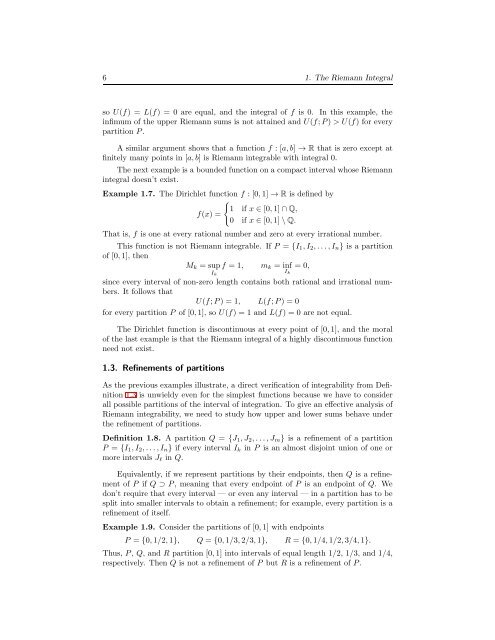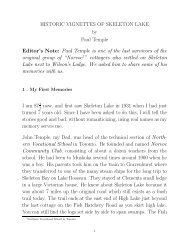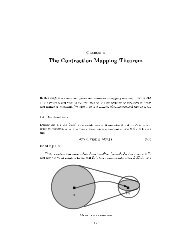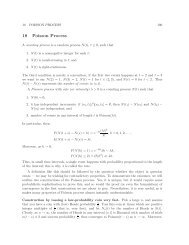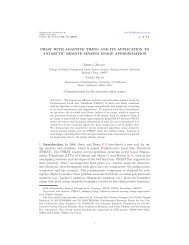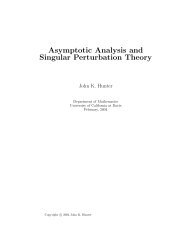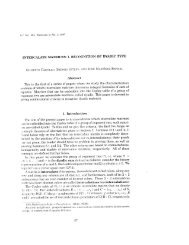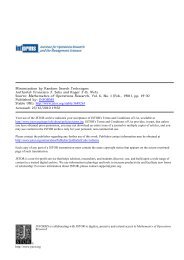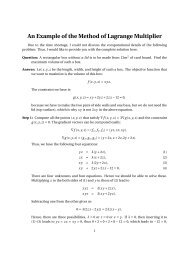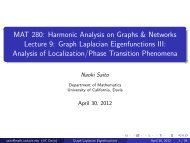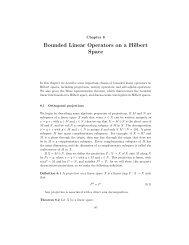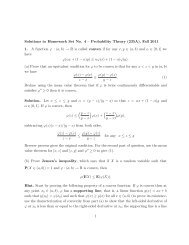The Riemann Integral
The Riemann Integral
The Riemann Integral
Create successful ePaper yourself
Turn your PDF publications into a flip-book with our unique Google optimized e-Paper software.
6 1. <strong>The</strong> <strong>Riemann</strong> <strong>Integral</strong><br />
so U(f) = L(f) = 0 are equal, and the integral of f is 0. In this example, the<br />
infimum of the upper <strong>Riemann</strong> sums is not attained and U(f;P) > U(f) for every<br />
partition P.<br />
A similar argument shows that a function f : [a,b] → R that is zero except at<br />
finitely many points in [a,b] is <strong>Riemann</strong> integrable with integral 0.<br />
<strong>The</strong> next example is a bounded function on a compact interval whose <strong>Riemann</strong><br />
integral doesn’t exist.<br />
Example 1.7. <strong>The</strong> Dirichlet function f : [0,1] → R is defined by<br />
{<br />
1 if x ∈ [0,1]∩Q,<br />
f(x) =<br />
0 if x ∈ [0,1]\Q.<br />
That is, f is one at every rational number and zero at every irrational number.<br />
This function is not <strong>Riemann</strong> integrable. If P = {I 1 ,I 2 ,...,I n } is a partition<br />
of [0,1], then<br />
M k = supf = 1, m k = inf = 0,<br />
I k<br />
I k<br />
since every interval of non-zero length contains both rational and irrational numbers.<br />
It follows that<br />
U(f;P) = 1, L(f;P) = 0<br />
for every partition P of [0,1], so U(f) = 1 and L(f) = 0 are not equal.<br />
<strong>The</strong> Dirichlet function is discontinuous at every point of [0,1], and the moral<br />
of the last example is that the <strong>Riemann</strong> integral of a highly discontinuous function<br />
need not exist.<br />
1.3. Refinements of partitions<br />
As the previous examples illustrate, a direct verification of integrability from Definition<br />
1.3 is unwieldy even for the simplest functions because we have to consider<br />
all possible partitions of the interval of integration. To give an effective analysis of<br />
<strong>Riemann</strong> integrability, we need to study how upper and lower sums behave under<br />
the refinement of partitions.<br />
Definition 1.8. A partition Q = {J 1 ,J 2 ,...,J m } is a refinement of a partition<br />
P = {I 1 ,I 2 ,...,I n } if every interval I k in P is an almost disjoint union of one or<br />
more intervals J l in Q.<br />
Equivalently, if we represent partitions by their endpoints, then Q is a refinement<br />
of P if Q ⊃ P, meaning that every endpoint of P is an endpoint of Q. We<br />
don’t require that every interval — or even any interval — in a partition has to be<br />
split into smaller intervals to obtain a refinement; for example, every partition is a<br />
refinement of itself.<br />
Example 1.9. Consider the partitions of [0,1] with endpoints<br />
P = {0,1/2,1}, Q = {0,1/3,2/3,1}, R = {0,1/4,1/2,3/4,1}.<br />
Thus, P, Q, and R partition [0,1] into intervals of equal length 1/2, 1/3, and 1/4,<br />
respectively. <strong>The</strong>n Q is not a refinement of P but R is a refinement of P.


